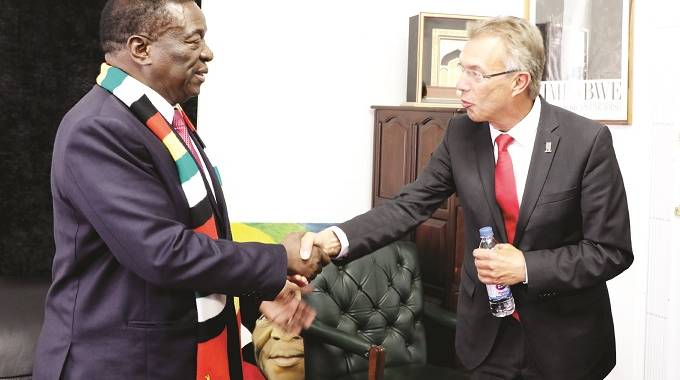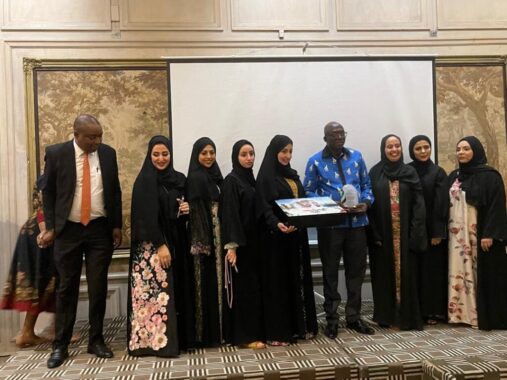Political will can spur agricultural research

Sifelani Tsiko
The meeting between President Mnangagwa and International Maize and Wheat Improvement Centre (CIMMYT) director-general Dr Martin Kropff on Tuesday this week demonstrates the much needed political will that can have a profound and positive impact on Zimbabwe’s agricultural research opportunities.
For years, lack of political will has been a major barrier to widescale adoption of new agricultural technologies in Zimbabwe and across Africa.
The missed agricultural research opportunities came at a huge cost in terms of loss of the much needed research funding, non adoption of new technologies which could spur agricultural production and enhance food and nutrition security and the flight of skilled agricultural research specialists.
Lack of high level political will also frustrated many of our highly gifted scientists who have since left the country to work for such global agricultural giants such as Monsanto and many other agro-chemical and processing companies.
President Mnangagwa’s accessibility and eagerness to engage international agricultural research institutions is a huge plus for the local scientific community.
It represents a significant break with the past which was unwilling to move forward and adopt new technologies which could easily boost agricultural production and enhance the livelihoods of the majority of our farmers.
Engaging with CIMMYT and the Water Efficient Maize for Africa (WEMA) project which uses breeding materials contributed by the International Maize and Wheat Improvement Centre’s Drought Tolerant Maize for Africa (DTMA) project, Monsanto company and other agricultural research institutions, can open Zimbabwe to agricultural innovations that could easily improve crop yields and enhance food security.
Zimbabwe now has a national strategy for biotechnology in agriculture which aims to focus on solving important scientific and agricultural problems through institutional structures available to support research, training researchers in new scientific areas and promoting the adoption of new technology.
President Mnangagwa’s Zimbabwe is open for business mantra is moving into the field of agricultural research through the engagement of international partners to help implement a more effective national strategy for modernising our agricultural sector.
It’s a giant step, which will also addresses the long-term needs and policy concerns of integrating new approaches such as biotechnology into our agricultural system to boost output and enhance our food security.
It also demonstrates his commitment to placing economic and political decisions at the heart of all the country’s development efforts.
Zimbabwe must change the way it does business and look beyond the old agricultural technologies we have to adopt new innovations that could bring scientific innovations and new crop hybrids to the forefront of the debate.
We have been losing out on projects such as the WEMA project – a public-private partnership coordinated by the African Agricultural Technology Foundation (AATF) supported by partners such as CIMMYT, Monsanto, and other global agricultural research institutions.
Funding is provided by the Bill & Melinda Gates Foundation and the Howard G Buffet Foundation, resources which Zimbabwe can easily tap into for the benefit of its researchers in seed companies, government agencies, farmer groups and other relevant organisations in the country’s agricultural sector.
For too long, politicians and scientific researchers have simply talked past each other without any meaningful engagement and dialogue over important agricultural innovations that could help Zimbabwe provide solutions to the pressing food security issues.
The meeting between President Mnangagwa and Dr Kropff signals that the time has come to unify our political leadership and our scientific fraternity to develop a common language for sustainable agricultural development that transcends our silos.
In other words, this simply calls on our politicians, local scientists and their international research collaborating partners to bring the sustainable agricultural development paradigm into mainstream economics.
It is time for Zimbabwe to remove barriers to the adoption of new agricultural technologies, including conflicting statements on biotechnology and unpredictable and cumbersome regulatory systems.
Scientists must now come out of their laboratory silos, engage more and communicate more to counter fear-mongering campaigns by anti–technology activists as well as find meaningful ways to mobilise funding for science and technology efforts in the country.
We must move away from politicising everything here in Zimbabwe and embrace new innovations that will enhance our yields and uplift the livelihoods of our farmers.
Very low political will should not have a place in a Zimbabwe aiming to be a middle income economy by 2030.
Misconceptions, mistrust and poor engagement between researchers and politicians must end for Zimbabwe to move forward.
Agriculture has moved from a resource- based sector to a science-based industry as science and technology have been substituted for land and labour.
This transition now affects agriculture and food producing systems throughout the world. Technology has driven this change toward more effective and efficient production practices and Zimbabwe’s current political and economic policies governing agriculture should fully recognise and take these changes into account.
As a country we have no choice, but to adopt new and better technologies that will enable us to become more efficient and competitive in developing new markets and capturing old markets for our agricultural products.
All this is dependent on our political leadership and competitiveness of our agricultural research system which must have the ability to translate better technologies into practice.
In many ways, agricultural research must make Zimbabwean farming a more profitable, reliable, and durable business able to compete in both domestic and international markets.
Innovation is crucial all this. It can provide scientists with new approaches to develop higher yielding and more nutritious crop varieties, improve resistance to diseases and adverse conditions, or reduce the need for fertilisers and other expensive agricultural chemicals.
President Mnangagwa’s commitment to agricultural research should be embraced. It will certainly enhance dialogue and co-operation on science, technology and innovation issues.
It’s time to start putting our money where our mouth is to improve our agricultural system. Our political leadership and all scientists must take a convincing and engaging stand on agricultural issues such as land, food import policies, innovation and technology, climate change responses and others to help Zimbabwe attain food security.










Comments